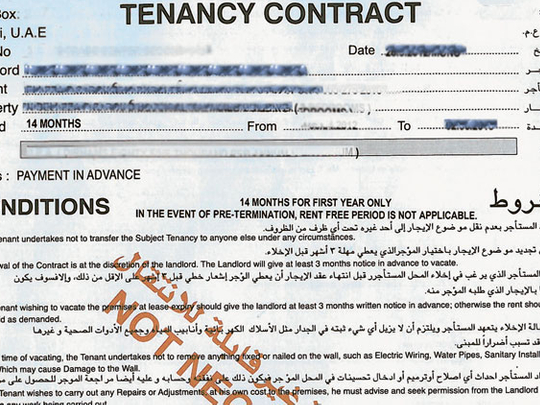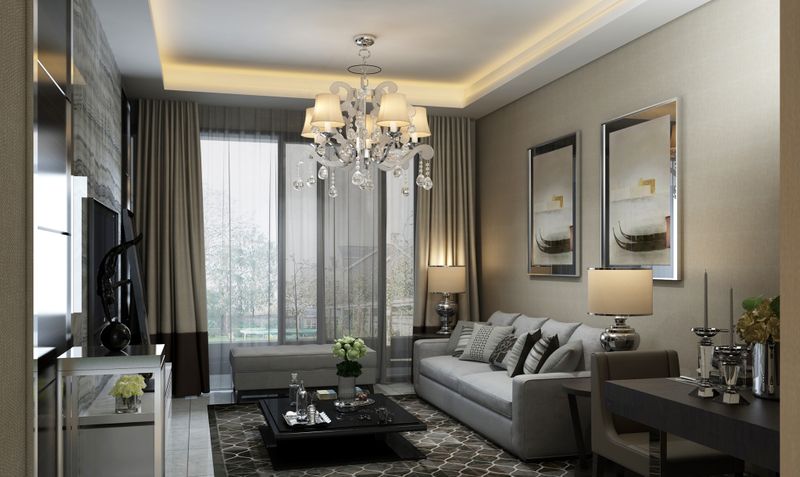
Dubai: Moving into a new residential unit? If you are about to sign your rental contract and the fine print seems too dense, you may make the mistake of skipping through the details and quickly signing off.
However, it is essential to be aware of what the contract states and the exact arrangement you are getting into with your landlord, to ensure there are no hiccups along the way. Whether you wish to terminate your contact early, or find yourself in a position where the residential unit needs maintenance work, if you are aware of the clauses within your rental contract, you would be better placed to know your rights and responsibilities. Knowledge of the rental laws and your contract can also put you in a stronger position when you need to negotiate with your landlord at any point in time.
So, here are the top clauses you should check in your lease agreement before you sign on the dotted line.

1. Is the leased premises clearly defined in the contract?
According to Dubai’s Rental Law No. 26 of 2007, more commonly referred to as the Rent Law, a tenancy contract must contain the following information:
1. Description of the property in detail
2. The purpose of tenancy
3. Name of landlord
4. Number and type of land
5. Name of the area
6. Period of tenancy
7. Rent value
8. Method of payment
2. All properties subject to this law, or its amendments, are to be registered with the Agency. However, judicial bodies and governmental departments and authorities should not consider any claim, case or execution based on a tenancy contract unless the same is registered with the Agency in accordance with rules and conditions set for this purpose.
So, the first clause to check is how the residential unit has been defined in the contract. This becomes particularly important in case of units that have not yet been completed, according to Reda Hegazy, Senior Legal Advisor and Arbitrator at Al Suwaidi and Company.
“In case the landlord has rented out a unit which has not yet been completed, the tenancy contract should mention who will be responsible for the preparation of the unit to be fit for rent purposes. If it is the tenant who will take the responsibility to prepare the unit, will he be entitled to a refund for the cost incurred, or will the cost incurred be deducted from the rental amount? Such instances must be mentioned in the tenancy contract to avoid any possible dispute,” he said.

In case the landlord has rented out a unit which has not yet been completed, the tenancy contract should mention who will be responsible for the preparation of the unit to be fit for rent purposes. If it is the tenant who will take the responsibility to prepare the unit, will he be entitled to a refund for the cost incurred, or will the cost incurred be deducted from the rental amount? Such instances must be mentioned in the tenancy contract to avoid any possible dispute.
2. Ancillary rights like parking spaces
Apart from the premises being defined in the contract, it should also clearly state any ancillary rights the tenant has, according to Kieran Lavis, an associate at Al Tamimi and Company said.
“One common example of such rights is the right to use a specified number of car parking spaces, whether on a designated or non-designated basis,” he said.
3. Furnished or semi-furnished flats must mention movables and machinery

Hegazy also advised tenants to clearly look at any additional equipment or furniture that may be provided by the landlord.
“In case the rented unit will be used for a specific purpose such as a restaurant or if the unit is semi- or fully-furnished, an appendix or a list of the movables and machinery should be attached in the tenancy contract,” he said.
4. What happens in case of modifications or improvements?
Overtime you may make certain changes to your home to suit your living needs. However, it is best to check your rental contract regarding handover requirements at the end of your tenancy. This could include any partitions or artificial grass turfs you may install, or any fixtures that you may remove over the years.
“The tenancy contract should contain a handover condition or clause. The fixture installed by the tenant in the unit cannot be removed without the consent of the landlord. If it will affect the property, is also worth mentioning in the contract,” Hegazy said.
A good practice is to take pictures of the apartment or villa before moving in and having the landlord acknowledge that the pictures represent the state and condition of the premises on handover, according to Malek Al Rifai, Senior Associate at Al Tamimi and company.
“This is important as Article 21 of the Tenancy Law provides that on the expiry of the tenancy contract the tenant must surrender the premises to the landlord in the same condition as it was received on handover, with the exception of ordinary wear and tear,” he added.
5. Early termination
What happens in case of an early termination? This is perhaps one of the most important clauses that need to be checked, especially in contracts that have been drafted for more than the typical term of one year. According to Hegazy, early termination cannot be done unless the parties agree to it or due to reasons that fall within the rental law.
“As per Article 7 of the Rent Law, in case of early termination of the tenancy contract, neither party can terminate the contract before the end of the tenancy period, unless the parties agree or due to any legal reason in accordance with the provisions of the law. That means neither the tenant nor the landlord can, with his sole discretion, terminate the contract, so it is best to agree in the contract on the corresponding penalties or the compensation for the early termination,” Hegazy said.
This could include an additional rent of two months apart from a requirement in the contract to give a two-month advance notice to the landlord. While contracts are normally drafted for a year, in special cases the landlord may get into a longer agreement with a tenant.
“We often see tenants who are new to Dubai entering into tenancy contracts with terms of three or four years. Entry into a tenancy contract with a longer term can sometimes be helpful as landlords may be more inclined to offer preferential rental rates in exchange for securing a longer term tenant,” Lavis said.
In such contracts, it is essential for tenants to make sure that they are satisfied with the unit and that it would serve their needs in the long term. If not, getting out of the contract may cost you a lot, and the terms mentioned in the contract, therefore, should be clearly understood.

We often see tenants who are new to Dubai entering into tenancy contracts with terms of three or four years. Entry into a tenancy contract with a longer term can sometimes be helpful as landlords may be more inclined to offer preferential rental rates in exchange for securing a longer term tenant.
6. Who pays for maintenance?
Depending on the amount of maintenance required as well as the cause of the damage, the landlord or the tenant may be responsible for covering the maintenance cost. This is why it is important to pay special attention to this clause in your contact.
“As per Article 16 of the Rent Law and the Rental Dispute Center provisions, the maintenance and repair works required for the tenant’s use of the rented property or unit such as the central air conditioning, swimming pool, the main parts of the plumbing and electricity, should be undertaken by the landlord. For other regular maintenance such as the replacement of light bulbs or repainting of wall in the unit, the cost shall be borne by the tenant, unless they have agreed otherwise,” Hegazy said.

Tenants should note that Article 34 of the Tenancy Law prohibits landlords from disconnecting services to the premises or preventing the tenant from benefiting from the premises during the term of the tenancy contract. In light of this provision, tenants should resist any attempts by the landlord to include drafting in the tenancy contract that seeks to give the landlord the right to disconnect services to the premises or to prevent the tenant from accessing or benefiting from the premises during the term of the tenancy contract.
7. The deposit
In case of regular units, the typical security deposit payable is five per cent of the annual rent. In case of furnished units, this can go up to 10 per cent.
“Unless there is a good reason, tenants should resist landlord demands for higher deposit sums. They should also make sure to pay the security deposit directly to the landlord and must insist that their tenancy contract specifies – preferably on a restrictive basis – the instances in which the landlord is permitted to apply the security deposit, with a clear obligation on the part of the landlord to return the security deposit or its balance following the expiration of the term of the tenancy contract or its early termination,” Lavis said.







